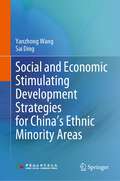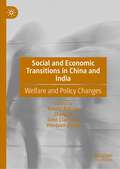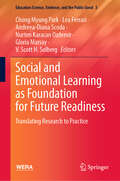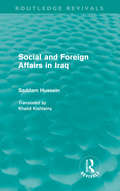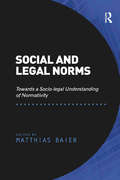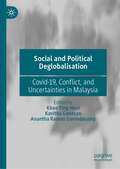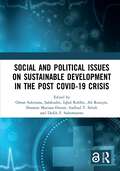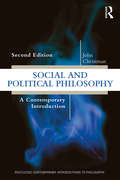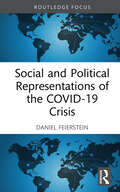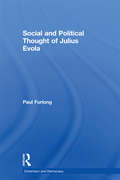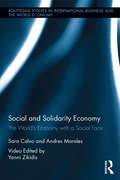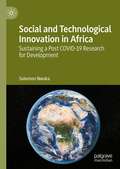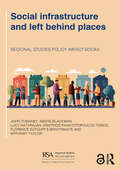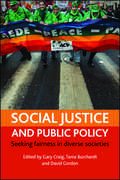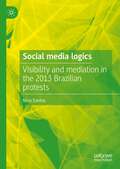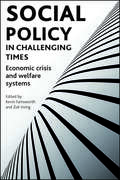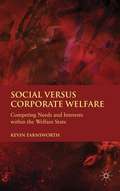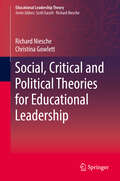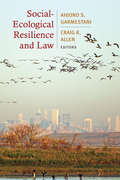- Table View
- List View
Social and Economic Stimulating Development Strategies for China’s Ethnic Minority Areas
by Yanzhong Wang Sai DingThis book gathers the outcomes of various, extensive research efforts on building a moderately prosperous society in minority areas, which would allow China’s poor and poverty-stricken areas to comprehensively join the rest of society. Offering an essential reference guide, the book will help readers understand the process, achievements, problems, and future development with regard to building a moderately prosperous society in the new era.
Social and Economic Transitions in China and India: Welfare and Policy Changes
by John Clammer Keerty Nakray Zhang Yi Wenjuan ZhangThis book conducts a comparative analysis of social and economic changes in the welfare state transformations in China and India, at national and sub-national levels. Discussions are made based on impacts from the social and economic changes in the last century and the fourth industrial revolution on welfare state transformations in China and India, the world's two largest countries in terms of population and density.First-hand empirical work is conducted by a group of scholars from India and China, which draws on inter-disciplinary and cross-cultural academic traditions to deepen social, cultural and legal understanding between the two countries.This book would appeal to undergraduate and graduate students in comparative sociology, political science, law and comparative welfare studies as well as researchers in these fields, as well as researchers in policy think-tanks and research institutes and officials in government and non-governmental organizations.
Social and Emotional Learning as Foundation for Future Readiness: Translating Research to Practice (Education Science, Evidence, and the Public Good #3)
by V. Scott H. Solberg Chong Myung Park Lea Ferrari Andreea-Diana Scoda Nurten Karacan Ozdemir Gloria MarsayThe book offers a global perspective on social and emotional learning skills (SEL) by summarizing findings from a collaborative multi-national and cross-cultural study of educator perceptions regarding the nature and value of SEL skills conducted by career development researchers from 19 countries. In addition to promoting success in education, SEL skills serve as the “durable,” human skills that support success in the world of work. The chapters explore research from three key regions: the Global South, Asia, and the Global North. Alongside comparative analyses of SEL, the book highlights strategies for designing culturally responsive interventions to develop SEL and future-readiness skills. Each region provides tailored recommendations for implementing SEL and career development programs and services. This collaborative research effort offers a unique opportunity to reexamine assumptions underpinning career development theory and practice. It presents a transformative research model that conceptualizes SEL skills policies and practices that are responsive to the diverse sociopolitical contexts and cultural values found in different regions around the world.
Social and Foreign Affairs in Iraq (Routledge Revivals)
by Saddam HusseinFirst published in 1979, prior to the Iran-Iraq war, this important collection of speeches explains some of the strategic foundations of Iraq's foreign and internal policies under the Ba'th Arab Socialist Party. This work concerns itself with aspects varying from advice on youth - 'Let us win the young to safeguard the future' -,to speeches on Iraq's diplomatic relations. This fundamental work, concerning a historical and contemporary range of social and foreign affairs in Iraq, will be of considerable value to both political and diplomatic departments, and universities and research organisations involved with the Middle East. It is also of major significance to anyone with an interest in the rise to power of one of the twentieth century's most infamous dictators.
Social and Legal Norms: Towards a Socio-legal Understanding of Normativity
by Matthias BaierIn an era where new areas of life and new problems call for normative solutions while the plurality of values in society challenge the very basis for normative solutions, this book looks at a growing field of research on the relations between social and legal norms. New technologies and social media offer new ways to communicate about normative issues and the centrality of formal law and how normativity comes about is a question for debate. This book offers empirical and theoretical research in the field of social and legal norms and will inspire future debate and research in terms of internationalization and cross-national comparative studies. It presents a consistent picture of empirical research in different social and organizational areas and will deepen the theoretical understanding regarding the interplay between social and legal norms. Including chapters written from four different aspects of normativity, the contributors argue that normativity is a result of combinations between law in books, law in action, social norms and social practice. The book uses a variety of different international examples, ranging from Sweden, Uzbekistan, Colombia and Mexico. Primarily aimed at scholars in sociology of law, socio-legal studies, law and legal theory, the book will also interest those in sociology, political science and psychology.
Social and Political Change in Revolutionary China: The Taihang Base Area In The War Of Resistance To Japan, 1937-1945 (World Social Change)
by David S. GoodmanThis in-depth study examines the influence of the Chinese Communist Party&’s effective organizing in Shanxi Province during the War of Resistance. Shanxi Province was on the frontlines of the 1937–1945 War of Resistance against Japan—the war that launched the Chinese Communist Party. During that time, the Taihang Base Area of Southwest Shanxi was one of the Party&’s most important strongholds. David Goodman provides the first county-level analysis of social and political change in the Taihang Base Area during those crucial years. Goodman explores revolution as process, arguing that the Party was successful because of its management of revolutionary incrementalism. He examines the roles of various groups, highlighting the activities of urban intellectuals, teachers, and peasant small-holders as agents of change. Based on newly available sources, including recently republished materials from the Taihang Base Area, restricted documentation from the Taiyuan Archive, and interviews with veterans of the Taihang Base Area this meticulously researched work deepens our understanding of the social and political origins of the Chinese revolution.
Social and Political Deglobalisation: Covid-19, Conflict, and Uncertainties in Malaysia
by Khoo Ying Hooi Kavitha Ganesan Anantha Raman GovindasamyThis book focuses on the discourse of de-globalisation in Malaysia by looking at the implications of this process politically, economically, socially, and environmentally. The rise of right-wing political parties and a decline in global economic interdependence have rapidly fuelled the de-globalisation process by creating conflicts and uncertainties in many parts of the world. The battle against the Covid-19 pandemic has spurred a great challenge among the global community, thus becoming a catalyst in the de-globalising process worldwide. While there have been contested opinions on whether we are now in the temporary phase of de-globalisation, what is clear is that the pandemic adds momentum to the trend. Now that the world has entered the post-Covid-19 phase, is the discourse of de-globalisation still relevant? Since the emergence of this pandemic, Malaysia has been facing not only a change of government but also a rapid decline in its economy, a rise in unemployment and living costs, with the human rights situation deteriorating as the State of Emergency was imposed. All of these add up to a shift toward de-globalisation. Chapters in this book, therefore, engage with this issue from different perspectives, such as conventional warfare, bio-constitutional implications to the right to health, labour, migrants and refugees, digital education, indigenous people and so forth.
Social and Political Issues on Sustainable Development in the Post Covid-19 Crisis: Proceedings of the International Conference on Social and Political Issues on Sustainable Development in the Post Covid-19 Crisis (ICHSOS 2021), Malang, Indonesia, 18-19 June 2021
by Oman SukmanaAs a threat, a pandemic has indirect implications for social, economic and political conditions both at domestic and international levels. Thus, collective and comprehensive efforts are needed in responding to and preventing the expansion of infections caused by the virus, including Covid-19. This international conference provides the discourse on social, economic as well as political issues regarding the condition after the pandemic. Social issues are studied through social welfare, sociology, governance, communication and international relations approaches. Meanwhile, economic problems are discussed through business, economic development and economic management approaches. Under the First International Conference on Humanities and Social Sciences (ICHSOS) 2021, speakers from several countries provided solutions and alternative perspectives in preventing and dealing with problems after the Covid-19 pandemic. This book contains 42 papers presented at the conference.
Social and Political Philosophy: A Contemporary Introduction
by John ChristmanThis accessible and user-friendly text will prove invaluable to any student coming to social and political philosophy for the first time. It provides a broad survey of fundamental social and political questions in modern society, as well as clear, accessible discussions of the philosophical issues central to political thought.Topics covered include: the foundations of political authority, the nature and grounds of economic justice, the limits of tolerance, considerations of community, race, gender, and culture in questions of justice, and radical critiques of current political theories.
Social and Political Philosophy: A Contemporary Introduction (Routledge Contemporary Introductions to Philosophy)
by John ChristmanThis accessible book is invaluable to anyone coming to social and political philosophy for the first time. It provides a broad survey of key social and political questions in modern society, as well as clear discussions of the philosophical issues central to those questions and to political thought more generally. Unique among books of this kind is a sustained treatment of specifically social philosophy, including topics such as epistemic injustice, pornography, marriage, sexuality, and the family. The relation between such social questions and specifically political topics is discussed. These topics include: political authority, economic justice, the limits of tolerance, considerations of community, race, gender, and culture in questions of justice, and radical critiques of current political theories. Updates to the Second Edition emphasize the non-statist areas of the subject and include two brand new chapters on social philosophy and transnational justice. This Second Edition also includes revisions throughout and coverage of recent theoretical discussions and world events.
Social and Political Philosophy: Contemporary Perspectives
by James P. SterbaSocial and Political Philosophy introduces some of the most important topics in contemporary political philosophy and questions whether these can be accommodated within the framework of liberal theory. It consists of specially written essays by prominent figures in social and political philosophy. Each essay carefully considers both the theoretical and practical problems of a major topic. Traditional perspectives are balanced with new challenges. Topics include: * Moral Methodology* Libertarianism* Socialism* Lesbian and Gay Perspectives* Feminism* Racial and Multicultural Perspectives* Rationality* Welfare Liberalism* Environmentalism* Virtue Ethics and Community* Just War Theory and Pacifism* Civil Disobedience.
Social and Political Representations of the COVID-19 Crisis (The COVID-19 Pandemic Series)
by Daniel FeiersteinWeaving together political, sociological, psychological and epidemiological analyses, Social and Political Representations of the COVID-19 Crisis provides revealing insights into the transformations wrought by the pandemic and the social divisions it has exposed. Accounting for the realities of the pandemic across the globe, with a strong focus on experiences in the Global South, this book challenges readers to question their beliefs about the societies they live in and how these societies should respond to collective catastrophes. Originally published in Spanish, this English edition is thoroughly revised and updated. Social and Political Representations of the COVID-19 Crisis analyses the varied strategies attempted in different parts of the world to deal with the pandemic, including elimination, mitigation, flattening the curve, and herd immunity, and the ramifications of these approaches. It argues that the different strategies are guided by social representations that can be analysed on epistemological, emotional and ethical-moral levels. Drawing upon a wide range of thinkers, the book also investigates the key role of psychological defence mechanisms, including different ways of denying the seriousness of the pandemic and different paranoid responses to pain and frustration, such as scapegoating and conspiracy theories. This timely book analyses the transformations in the social fabric brought about by the pandemic and the questions it poses for the future of our societies. It will therefore be of great interest to students and researchers in the humanities, social sciences, and public health as well as the general reader.
Social and Political Thought of Julius Evola (Extremism and Democracy)
by Paul FurlongJulius Evola’s writing covered a vast range of subjects, from a distinctive and categorical ideological outlook and has been extremely influential on a significant number of extreme right thinkers, activists and organisations. This book is the first full length study in English to present his political thought to a wider audience, beyond that of his followers and sympathisers, and to bring into the open the study of a neglected strand of contemporary Western thought, that of traditionalism. Evola deserves more attention because he is an influential writer. His following comes from an important if largely ignored political movement: activists and commentators whose political positions are, like his, avowedly traditionalist, authoritarian, anti-modern, anti-democratic and anti-liberal. With honourable exceptions, contemporary academic study tends to treat these groups as a minority within a minority, a sub-species of Fascism, from whom they are held to derive their ideas and their support. This work seeks to bring out more clearly the complexity of Evola’s post-war strategy, so as to explain how he can be adopted both by the neo-fascist groups committed to violence, and by groups such as the European New Right whose approach is more aimed at influence from within liberal democracies. Furlong also recognises the relevance of Evola’s ideas to anti-globalisation arguments, including a re-examination of his arguments for detachment and spontaneism (apolitia).
Social and Psychological Dimensions of Personal Debt and the Debt Industry
by Carl Walker Serdar M. DegirmenciogluAn understanding of personal debt requires an understanding of the complex social systems that produce poverty. By drawing upon international perspectives, this book investigates why more and more people are in debt, why it is causing so much mental distress and exactly who is benefiting from what has become the world's number one growth industry.
Social and Solidarity Economy: The World’s Economy with a Social Face (Routledge Studies in International Business and the World Economy)
by Sara Calvo Andres Morales Yanni ZikidisThis book aims to provide the reader with an insight into the relevance of a section of the economy, which is often referred to as the ‘social and solidarity economy’ (SSE); and highlight some of the current issues in the field, how they are being addressed and some of their future implications. Using case studies from around the world, this book ‘Social and Solidarity Economy: The World’s Economy With a Social Face’ provides an up-to-date account of the strengths and weaknesses of these initiatives across four continents including issues that have not been researched sufficiently before (e.g. circular economy, social propaganda and its dangers, social enterprise as a panacea for NGOs in developing countries, and ‘new’ social movements). There is growing interest in SSE initiatives among policymakers, foundations, researchers and academic institutions around the world. Despite this interest, SSE related research remains scarce. There are concerned that SSE initiatives, which contribute significantly to their local communities’ development, need to be more widely disseminated amongst the general public. The Social and Solidarity Economy: The World’s Economy With a Social Face will help promote the ground-breaking work being done by organisations and individuals but which remain undocumented and help to raise awareness of such initiatives as well as contribute to academia with a critical approach to the sector covering issues that have not been covered much before, such as the circular economy and the dangers of social propaganda. Aimed at researchers, academics and policy makers in the fields of Social Enterprise, CSR, Tourism, International Economics as well as supporting disciplines ‘Social and Solidarity Economy: The World’s Economy With a Social Face’ looks to establish and help define the field.
Social and Technological Innovation in Africa: Sustaining a Post COVID-19 Research for Development
by Solomon NwakaThis book examines the landscape of sustained investment in research and innovation in Africa, which are critical for development. This cutting-edge analysis is based on empirical evidence and the author’s experience in managing health and related innovations on the continent and globally. It concludes, for the first time, that African innovation is largely driven by the principles of Social, rather than Technological innovation. The significance of this finding and the need to optimize, scale and sustain this dominant innovation is addressed in various chapters that analyze the status, challenges and opportunities. Particularly, the financing, collaboration and coordination patterns for these activities on the continent show a fragmented ecosystem that is largely dependent on external donors and aid. The importance of supportive policies, leadership and venture mechanisms that incentivizes public and private entities to innovate is further exemplified by the lessons of the COVID-19 pandemic. The book proposes mechanism to address identified challenges.
Social and Technological Management in Dry Lands
by Nancie L. GonzalezRecent international attention has focused on desertification and its concomitants, especially the diminution of flora and fauna in arid and semiarid lands and the resulting reduction in the economic value of those lands. Natural factors such as drought and wind erosion, as well as various technological practices, have been blamed for the present situation in many countries. Most observers agree that human beings have been both perpetrators and victims of desertification. Anthropologists have long been interested in documenting hew different societies have affected and been affected by their environments. The papers in this volume present ease studies of societies ranging from ancient Peru to contemporary Israel, along with several topically oriented works. All are designed to illustrate how various societies--whether by water management or by the exploitation of plants and animals--have attempted to achieve ecological balance. Social organization and ideology as well as technology are discussed as important variables affecting the ways in which populations adapt to, or cope with, desertification.
Social infrastructure and left behind places (Regional Studies Policy Impact Books)
by John Tomaney Lucy Natarajan Florence Sutcliffe-Braithwaite Maeve Blackman Dimitrios Panayotopoulos-Tsiros Myfanwy TaylorThis book explores the making, unmaking and remaking of social infrastructure in ‘left-behind places’. Such places, typically once flourishing industrial communities that have been excluded from recent economic growth, now attract academic and policy attention as sites of a political backlash against globalisation and liberal democracy. The book focuses on the role of social infrastructure as a key component of this story. Seeking to move beyond a narrowly economistic of reading ‘left behind places’, the book addresses the understudied affective dimensions of ‘left-behindness’. It develops an analytical framework that emphasises the importance of place attachments and the consequences of their disruption; considers ‘left behind places’ as ‘moral communities’ and the making of social infrastructure as an expression of this; views the unmaking of social infrastructure through the lens of ‘root shock’; and explains efforts at remaking it in terms of the articulation of ‘radical hope’. The analysis builds upon a case study of a former mining community in County Durham, North East England. Using mixed methods, it offers a ‘deep place study’ of a single village to understand more fully the making, unmaking and remaking of social infrastructure. It shows how a place once richly endowed with social infrastructure, saw this endowment wither and the effects this had on the community. However, it also records efforts of the local people to rebuild social infrastructure, typically drawing the lessons of the past. Although the story of one village, the methods, results and policy recommendation have much wider applicability. The book will be of interest to researchers, policy makers and others concerned with the fate of ‘left behind places’.
Social infrastructure and left behind places (Regional Studies Policy Impact Books)
by John Tomaney Lucy Natarajan Florence Sutcliffe-Braithwaite Maeve Blackman Dimitrios Panayotopoulos-Tsiros Myfanwy TaylorThis book explores the making, unmaking and remaking of social infrastructure in ‘left-behind places’. Such places, typically once flourishing industrial communities that have been excluded from recent economic growth, now attract academic and policy attention as sites of a political backlash against globalisation and liberal democracy. The book focuses on the role of social infrastructure as a key component of this story.Seeking to move beyond a narrowly economistic of reading ‘left behind places’, the book addresses the understudied affective dimensions of ‘left-behindness’. It develops an analytical framework that emphasises the importance of place attachments and the consequences of their disruption; considers ‘left behind places’ as ‘moral communities’ and the making of social infrastructure as an expression of this; views the unmaking of social infrastructure through the lens of ‘root shock’; and explains efforts at remaking it in terms of the articulation of ‘radical hope’.The analysis builds upon a case study of a former mining community in County Durham, North East England. Using mixed methods, it offers a ‘deep place study’ of a single village to understand more fully the making, unmaking and remaking of social infrastructure. It shows how a place once richly endowed with social infrastructure, saw this endowment wither and the effects this had on the community. However, it also records efforts of the local people to rebuild social infrastructure, typically drawing the lessons of the past. Although the story of one village, the methods, results and policy recommendation have much wider applicability.The book will be of interest to researchers, policy makers and others concerned with the fate of ‘left behind places’.The Open Access version of this book, available at http://www.taylorfrancis.com, has been made available under a Creative Commons Attribution-Non Commercial (CC-BY-NC) 4.0 license.
Social justice and public policy: Seeking fairness in diverse societies
by Gary Craig, Tania Burchardt and David GordonSocial justice is a contested term, incorporated into the language of widely differing political positions. Those on the left argue that it requires intervention from the state to ensure equality, at least of opportunity; those on the right believe that it can be underpinned by the economics of the market place with little or no state intervention. To date, political philosophers have made relatively few serious attempts to explain how a theory of social justice translates into public policy. This important book, drawing on international experience and a distinguished panel of political philosophers and social scientists, addresses what the meaning of social justice is, and how it translates into the everyday concerns of public and social policy, in the context of both multiculturalism and globalisation.
Social media logics: Visibility and mediation in the 2013 Brazilian protests
by Nina SantosThis book offers a unique perspective on the Brazilian communication environment in the middle of its most serious political crisis after a military dictatorship. The 2013 protests were an important turning point in the political life of the country, and are often seen as the trigger of many communicational and political dynamics that have led to recent political events, such as the election of a far right wing president. Understanding the transformation of the communication environment at that moment, as well as its consequences, helps to explain what is happening in the country today. The book’s argument finds its foundations in the following: a systemic view of the communication environment, a conception of technology as structured and transformed by its use, and an understanding of communicational dynamics as an essential part of democratic systems. Drawing on both interviews with key actors in the protests and on analysis of a corpus of tweets, the book assesses the relationship between the use of social media and the formation of mainstream discourses surrounding the concept of mediactivism. It also investigates alternative paths of information made possible by the use of social media when new mediators emerge, going on to search for an understanding of the consequences of social media visibility dynamics on the construction of the common world.
Social policy in challenging times: Economic crisis and welfare systems
by Kevin Farnsworth and Zoe IrvingThere is no precedent to the current economic crisis which looks set to redefine social policy debate throughout the globe. But its effects are not uniform across nations. Bringing together a range of expert contributions, the key lesson to emerge from this book is that 'the crisis' is better understood as a variety of crises, each mediated by national context. Consequently, there is an array of potential trajectories for welfare systems, from those where social policy is regarded as incompatible with the post-crisis economy to those where it is considered essential to future economic growth and security.
Social versus Corporate Welfare
by Kevin FarnsworthThe greatest myth of modern times is the suggestion that capitalism and corporations do better with less government. The global economic crisis has certainly put paid to this idea. But the massive emergency state bailouts and interventions put in place from 2008 were unique only in their size and scale. Government programmes, designed to meet the needs of business, are not just everyday, they are everywhere and they are essential. Just as social welfare protects citizens from the cradle to the grave, corporate welfare protects and benefits corporations throughout their life course. And yet, in most countries, corporate welfare is hidden and underresearched. Drawing on comparative data from OECD states, this book seeks to shed light on the size, uses and importance of corporate welfareacross variouswelfare regimes.
Social, Critical and Political Theories for Educational Leadership (Educational Leadership Theory)
by Richard Niesche Christina GowlettThis book makes the case for the continued and expanded use of social, critical and political theories in the field of educational leadership. It helps readers understand educational leadership by introducing them to a wide variety of theoretical and philosophical approaches and positions. The book incorporates a rich blend of ideas and concepts, and compares and contrasts the approaches discussed.The content largely focuses on four educational thinkers: Michel Foucault, Judith Butler, Bernard Stiegler and Karen Barad. The chapters do not cover each thinker’s oeuvre exhaustively, but instead provide a brief overview of his/her ideas, while also helping readers understand a particular aspect of the educational leadership discourse. Each chapter also provides supplementary reading recommendations for those interested in pursuing these ideas in more depth.
Social-Ecological Resilience and Law
by Craig Allen Ahjond GarmestaniEnvironmental law envisions ecological systems as existing in an equilibrium state, reinforcing a rigid legal framework unable to absorb rapid environmental changes and innovations in sustainability. For the past four decades, "resilience theory," which embraces uncertainty and nonlinear dynamics in complex adaptive systems, has provided a robust, invaluable foundation for sound environmental management. Reforming American law to incorporate this knowledge is the key to sustainability. This volume features top legal and resilience scholars speaking on resilience theory and its legal applications to climate change, biodiversity, national parks, and water law.
